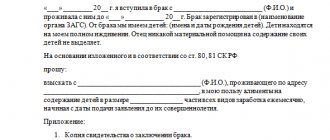Basically, the question of how parents will support their child arises after a divorce. However, marriage does not guarantee stable support for a minor. There are situations when, despite a registered relationship, parents live separately from each other. The reasons why the spouses decided not to dissolve the marriage do not play any role in the performance of their parental responsibilities.
If a child is provided for by only one of the parents, then alimony can be recovered from the other in court, even despite the official marriage. To do this you need to submit an application. A sample application for alimony in marriage will help with registration. The document is given below in the article.
In addition to the child, a wife who is carrying a baby or is on maternity leave to care for him until he reaches 3 years of age also has the right to receive financial support from his husband. If he does not want to do this voluntarily, then the money must be collected forcibly through the court.
When can you apply for spousal support?
Sometimes, even when living in the same house, parents participate in raising a child differently, and in some cases they withdraw from this process altogether. Situations when there are grounds for collecting money in court are different. These include the following:
- one of the parents abuses alcohol, on which all his earned money is spent;
- mother or father works remotely;
- one of the parents lives in the family, but does not give money to support the child;
- the mother or father does not work and does not try to find a job.
These are just a few examples, of which there are many more in practice. Their main meaning is the need to file a claim for the recovery of child support during marriage by one of the parents.
When a peaceful resolution of the problem is impossible, alimony is collected forcibly. This can be done in one of the following ways:
- in summary proceedings by filing an application for a court order;
- in the standard manner by filing a statement of claim.
In one and the other case, the court must be provided with irrefutable evidence that the second parent evaded the maintenance of his child (children).
Important! When applying for a court order, you need to take into account that if the defendant wants to challenge the issued document, the court will cancel the order and the plaintiff will have to file a standard statement of claim.
Application for a court order
A simplified process is when the court independently considers the application for alimony and issues a court order.
This method is chosen when everything is clear, documented and the judicial authorities have no questions.
In this case, there should be no objections from the parties; they will not be considered. In this manner, alimony is prescribed only in a certain percentage of earnings.
The key condition for collecting alimony through a court order outside of marriage is the confirmed paternity of the parent, established through the establishment of paternity or in other cases permitted by the RF IC.
It also applies when:
- permanent place of work;
- There is only one source of income and it is official.
To begin this process, submit an application and attach all documents that will serve as justification for all requirements.
A qualified lawyer will always tell you what documents are needed and whether there are grounds for filing a court order for alimony outside of marriage.
How to file a claim
A statement of claim for alimony in marriage must be drawn up in accordance with the established requirements of the Code of Civil Procedure of the Russian Federation. If the document is executed with any deviations, the court may refuse to consider it. The claim must contain the following information.
- The name of the court where the case will be heard.
- Information about the parties to the process (full name, date of birth, address and telephone number).
- Title “Claim for payment of alimony...”.
- The descriptive part provides complete information about the circumstances relevant to the case, namely: the time of marriage, the date of birth of the children, the fulfillment or non-fulfillment of obligations for their material maintenance. All data must be documented. Particular attention must be paid to collecting evidence of failure to fulfill obligations to support children.
- Request to collect alimony from an unscrupulous parent.
- List of attached documents.
- Date and signature.
At the same time, in the application for alimony without divorce, it is important to include references to the legislative acts that the plaintiff was guided by when drawing up the claim.
In order to correctly display all the information, when filing a claim, you should pay special attention to the following points:
- Indication of information about marriage. To do this, the plaintiff first writes the full name - his and the defendant's, then the date of this event, and after that - the date of birth of the child (indicating the full name).
- Complaint. The judge must clearly describe from what period the defendant ceased to take part in providing for the child. In addition, it should be noted that at the moment the only person supporting the child is the plaintiff, while the defendant, despite the plaintiff’s repeated requests, did not give money for the child’s maintenance, and also refused to enter into an agreement on the payment of alimony with a notary.
- Information about the defendant's financial situation. In order for the judge to assign an objective amount of alimony, the plaintiff must indicate where and with whom the defendant lives, as well as the person in whose name the living space is registered. If the defendant has dependents, this must be indicated in the application. Also important information will be the fact of official employment of the future alimony payer or lack thereof.
Below is an application for alimony in marriage, a sample of which will help you draw up the document correctly.
A sample statement of claim for the collection of child support during marriage can be downloaded here
Where to go to collect alimony
Since cases related to the collection of monetary support are considered exclusively by justices of the peace, the collector will have to go to court at the location of the defendant or child.
But there are a number of exceptions to this rule:
- when collecting alimony for a spouse , apply to the magistrate’s court at the location of the defendant;
- if a dispute arises about paternity or when dividing property , appeal to the district (similar - city or interdistrict) court at the location of the defendant or the child.
An appeal to the court at the place of residence of the plaintiff is also possible if he has health problems or other objective circumstances that preclude an appeal to the court at the location of the defendant.
Cost of claim
By law, the defendant must pay the following interest for child support:
- ¼ earnings – for 1 child;
- 1/3 of earnings – for 2 children;
- ½ earnings for 3 children.
By mutual agreement, a different amount may be provided for in the alimony agreement.
In addition, the law provides for a penalty in a fixed monetary equivalent. This occurs in the following cases:
- the parent does not have a permanent job;
- the parent is not employed;
- It is not possible to determine the amount of earnings for each month;
- part of the earnings is received in kind;
- The work of the alimony payer is seasonal.
How is the amount of alimony calculated?
If the parents agree peacefully, then they determine the amount of payments independently in a notarial agreement. During legal proceedings, the court sets the amount as a percentage of income. For one child you can recover 25% of your monthly earnings, for two children - 30%, for three or more - 50%.
“50% is the maximum amount of deduction from wages. If alimony is established as a percentage of income, alimony is paid from all types of income. Whether it’s a salary, the sale of a car or an apartment,” says lawyer Marat Amanliev.
If the payer has irregular earnings, then alimony can be collected in a fixed amount, or as a percentage of earnings and a fixed amount at the same time.
“Therefore, it cannot be said that there is a maximum amount of alimony. And the minimum amount of alimony is established by judicial practice - it is 25 percent of unemployment benefits or, as is often found in court decisions, half of the subsistence level,” says Natalya Nikolskaya.
Documentation
A claim for alimony in marriage according to the established model is filed with the court in several copies for all participants in the process. A note of acceptance is made on the plaintiff’s copy in the office. The attached documents include the following:
- photocopy of the parties' passports;
- a photocopy of the marriage document;
- photocopy of children's birth documents;
- certificate of children's registration address;
- certificate of income of the parent not providing for the children.
Attention! The court must be presented with documents about the parent's failure to fulfill his duties. All information specified in the claim cannot be unfounded. The data must be documented.
But if the circumstances are such that the plaintiff cannot obtain the relevant paper from the defendant, he has the right to petition the court (orally or in writing) for assistance in requesting a document. The following documents may serve as evidence.
- On the maintenance of children by the plaintiff (checks for various purchases and provision of other needs of children).
- Receipts for payment of housing and communal services.
- Receipts for payment for kindergarten, school meals, clubs and sports sections.
- Testimony of witnesses, oral and written, about what role each parent plays in the care of the children. These can be teachers, relatives, neighbors, doctors and other persons. If the child is over 10 years old, he himself can give relevant evidence to the court.
- Certificates, for example, about treatment with a narcologist, from the place of work about business trips or rotational work.
- Other evidence may also be provided that can convince the court that the responding party does not provide for their common children.
What is the procedure and deadline for payments?
Alimony must be paid monthly, usually at the beginning of the calendar month. For voluntary payments, parents can set any date and form convenient for them - in cash or by bank transfer.
“If alimony is collected on the basis of a court decision and a writ of execution, as part of enforcement proceedings, then the bailiffs send a corresponding resolution to the accounting department at the debtor’s place of work, which is the basis for withholding alimony for the maintenance of the child,” notes Vera Efremova.
Application deadlines
Civil legislation establishes limitation periods. However, they do not apply to family relationships, nor to the requirements that arise from them. Therefore, a claim can be filed regardless of the timing of marriage or the timing of divorce.
Important! The main thing that must be observed is that the application for alimony (sample) in marriage will be considered by the court if the child is a minor. But payments can also be recovered for the previous period, but not later than three years.
Shares of alimony as part of the execution of a court decision
The shares of alimony within the framework of the execution of a court decision also depend on the behavior of the parent who must pay it. Yes, according to the law, more than 50% cannot be collected from a person’s salary. But if a person violates his obligations and does not pay what is due, this rule may not be taken into account. Then the judge may oblige the unscrupulous parent to pay 70% of the salary.
ATTENTION : how to apply for alimony outside of marriage, the answer is simple: in the same order as while being married (after the spouses divorce), since the presence or absence of a marital relationship does not affect the procedure.
Expert opinion
There are no particular difficulties in collecting alimony in the absence of marriage registration. Everything is decided by preparation for the trial: the correct preparation of the statement of claim (application for a court order), elaboration of the applicant’s position and the completeness of the evidence base. A reasonable solution would be to involve the guardianship authorities in the process. This will strengthen the plaintiff's position in court.
Due to frequent updates to legislation and the legal uniqueness of each situation, we recommend obtaining a free telephone consultation with a lawyer. You can ask your question by calling the hotline number 8 (800) 555-40-36 or write it in the form below.
Additional features and nuances
The legislation of the Russian Federation provides for the possibility of going to court at any time - until the minor turns 18. The limitation period in this case is not established. But if it is necessary to collect debt for the past period, then the statute of limitations is 36 months.
Lengthy legal proceedings can significantly worsen the relationship between spouses, especially if they still live together. But they have the opportunity to prevent this by agreeing on alimony on their own. They will need to draw up an alimony agreement, reflecting in the document all the conditions for transferring funds to the needy party:
- size of payments, frequency of their transfer;
- method of transferring money (directly to the recipient of funds, bank transfer, etc.);
- grounds for termination of alimony obligations.
The document must be certified by an employee of a notary agency. After this, the agreement will become legally binding.
Can an ex-wife receive alimony not only for the child, but also for herself?
Yes, Chapter 14 of the Family Code of the Russian Federation describes several cases when the ex-wife can also claim alimony:
- ex-wife during pregnancy and for three years from the date of birth of their common child;
- a needy ex-spouse caring for a common disabled child until the child reaches the age of 18 or a common child who has been disabled since childhood, group I;
- a disabled, needy ex-spouse who became disabled before the dissolution of the marriage or within a year from the date of dissolution of the marriage;
- a needy former spouse who has reached retirement age no later than five years from the date of divorce, if the spouses have been married for a long time.
The court establishes alimony for a spouse in hard cash, and not as a percentage of earnings. The size depends on the financial and marital status of the former spouses. If the couple lived in a civil marriage, then such payments are not due.
Procedure if the father recognizes the child
Applicants need:
- draw up a general statement asking to determine paternity (the document must contain the signatures of both parties);
- go to the registry office;
- receive updated documents for the child, in which adjustments will be made (in the column “father, instead of a dash, enter the man’s name”).
You can view a sample application at this link.
Applicants also need to have the following certificates and papers with them:
- parents' passports;
- receipt of paid state duty;
- birth certificate of a child.
If a man knows that he is not the child’s relative, but still plans to become the child’s father, then the former father of the minor must draw up an official renunciation of paternity and have the document certified by an employee of a notary agency.
A certificate proving paternity is issued on the day of application.
Paternity can be determined voluntarily at any time. In this case, the man must be fully capable and draw up an application independently, without the help of a guardian or trustee.
What other practical nuances are there?
Any civil process has its practical aspects. The collection of alimony outside of marriage is no exception here.
What is the procedure for collecting alimony in a civil marriage?
Civil marriage refers to actual family relationships without legal registration of marriage. In this connection, all of the above and below presented rules, procedures, and conditions for collecting alimony are relevant in this situation.
Who can initiate
The parent who actually lives with the child and supports him has the right to initiate the process of forced alimony collection. If parents are deprived of parental rights or have their parental rights limited or do not perform their duties properly, the guardian (trustee) or guardianship authorities may pursue collection in the interests of the minor.
If actual family relations are interrupted and each parent lives with one or more common children under 18 years of age, then both parents have the right to recover funds for the maintenance of the children living with them from the other parent. Provided that he does not provide them voluntarily.
What to do after receiving a decision to collect alimony
The court decision comes into force one month after it is made in final written form, unless it is appealed by the other party. If the defendant files an appeal, the judicial act will come into force after the appeal ruling is issued.
For a decision that has entered into legal force, it is necessary to obtain a writ of execution. It is issued by the same court that issued the original judicial act. The writ of execution is submitted for the purpose of actually collecting funds at the payer’s place of work or to the FSSP.
Deadlines for filing and for what period can be recovered
It is permissible to go to court to forcefully collect funds for the maintenance of a child at any time, from the first year of life until he turns 18 years old - Art. 107 RF IC. But at the same time, alimony, as a general rule, is assigned from the moment the person goes to court.
It is also possible to collect money for the past period, but no more than for 3 years preceding the moment of appeal. The basic legal condition here is that the court must establish that before the plaintiff went to court, measures were taken to obtain funds for maintenance, but they were not received due to the defendant’s evasion from paying them.
The measures taken to obtain alimony are evidenced, in accordance with clause 11 of the RF PP No. 56:
- The plaintiff’s appeal to the defendant (for example, by sending telegrams, registered letters with notification or via e-mail) with a demand for payment of alimony or with a proposal to conclude an agreement on the payment of alimony.
- Applying to the court for a court order (if the court order was later canceled based on the payer’s objections).
How much can you expect/amount of alimony for an illegitimate child?
The amount of alimony collected for the maintenance of any child for whom paternity has been established or will be established in court is the same. It depends only on the following factors:
- The number of children for whose maintenance funds are simultaneously collected - Art. 81 IC RF. For 1 - ¼ of the income, for 2 - ⅓, for 3 or more - ½.
- Availability of a source of permanent income/income. If there is none or the collection in the shared part violates the interests of the parties, then alimony is prescribed in a fixed amount - Art. 83 RF IC. Most often, it is tied to PM for children in the region of residence.
Is it possible to apply for alimony outside of marriage if the father does not officially work?
If a parent is unemployed, it is still possible to apply for forced collection of alimony from him, since lack of income is not a basis for exemption from parental responsibilities. However, this can only be done through a claim proceeding and with the assignment of alimony in a fixed amount - Art. 83 RF IC.
Can a pregnant woman apply for alimony outside of marriage?
A pregnant woman has the right to apply for the recovery of funds for her maintenance from the future father of the child only if there is a legally formalized marriage relationship between them - Art. 89 RF IC. Civil marriage (actual family relationships) does not play any role here.
If a woman is married but pregnant by another man, then if the defendant proves this fact, the court has the right to refuse to satisfy the plaintiff’s claims.
Basic information
The legislation of the Russian Federation allows filing a claim with the court for alimony without a divorce, when the couple lives together. For example, alimony can be assigned to a wife on maternity leave if the man does not provide her with adequate financial support.
You can also apply for cash payments if you already have alimony - for example, they are transferred to a second child who recently appeared in the family, but the woman, due to her disability, plans to receive it for herself.
It does not matter whether the payer is disabled or unemployed. It is also possible to collect alimony from a parent if he is serving a prison sentence: if he does not transfer funds, he will develop a large debt, which he will need to repay after his release, even if the child has already reached the age of majority.
To get rid of the debt, the parent will need to go to court and prove the fact that, with all its desire, the administration of the institution was not able to provide him with conditions for work.
If a child has been disabled since childhood or was diagnosed with disability after the age of 18, then the alimony provider will need to transfer funds to him throughout his life.
Finally, alimony can also be recovered from a person who has been deprived of parental rights for serious reasons (cruel treatment of a minor, commission of a crime against his life and health, etc.). Lack of parental rights is not a condition for the cancellation of child support obligations.









